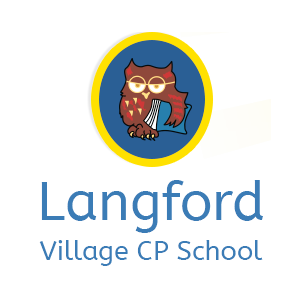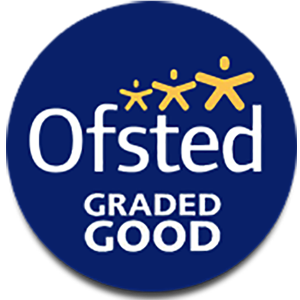




Intent:
In the Foundation Stage Unit at Langford Village Community Primary School, we place great value on the strong foundations of child development and children as individuals. It is our intent that all children, regardless of their background, circumstances or needs, develop physically, verbally, cognitively, and emotionally in an environment which values and celebrates all cultures, communities, and people.
We work collaboratively with parents and carers to provide our children with the knowledge, skills, understanding, and attitudes they need so that they can go on to be confident and independent, to believe in themselves and interact positively with others, as well as being active citizens of society, and happy, curious life-long learners. We prepare children to reach the Early Learning Goals at the end of the Foundation Stage and to support the future challenges of Key Stage One and beyond.
Our holistic curriculum maximises opportunities for meaningful cross-curricular links and learning experiences as well as promoting the unique child by offering extended periods of play and sustained thinking, following children's interests and ideas, providing opportunities to support learning, as well as to consolidate and deepen existing knowledge.
We work hard to provide a stimulating environment that provides exciting opportunities, promotes challenge, exploration, adventure, and a real love of learning full of warm, positive, and skilful adult interactions that support the children as they begin to link learning to their play and exploration. We value imagination and creativity and seek to create a sense of enjoyment and fascination in learning through a vibrant continuous indoor and outdoor provision, alongside visits into school, and regular Forest School sessions. It is the cultural capital we know our pupils need, rich in wonder and memorable experiences.
There are four overarching principles in the Early Years Foundation Stage (EYFS). Every child is unique and individual and will make progress at different rates. In order to thrive, learn and develop, they need to have opportunities to create positive relationships with others and explore environments that stimulate their curiosity. These principles underpin all aspects of teaching and learning in the Early Years Foundation Stage.
These are:
We ensure 7 Key Features of Effective Practice are a focus everything we do:
We are supported by Development Matters and Birth to Five Matters documents, alongside the Statutory EYFS Framework. Pupils work towards the Early Learning Goals of the Early Years Foundation Stage Curriculum in Nursery and Reception. The majority of children then move onto the National Curriculum Programmes of Study at the start of Year 1.
Our curriculum covers the seven areas of Learning and Development of the EYFS:
Prime Areas:
Specific Areas:
Our EYFS curriculum aims to enable our children to be:
Our Curriculum Goals have been created as an example of what a typical 4-5-year-old will have learnt through our play-based curriculum of high-quality adult interaction and focused activities. It is a part of what we teach children, not all of our curriculum. We recognise all children develop at different rates: some will take longer to develop these skills and may need extra support to do so. Some will exceed our expectations and work at greater depth during activities. All children will be taught from their starting point, making progress from their beginnings.
Implementation:
We aim to achieve our curriculum intent by providing high quality teaching and learning in a language rich environment through the use of songs, nursery rhymes, stories and providing time for quality interactions between adults and between peers.
At Langford Village, we value, respect and care for all of our children, each child is unique and brings an irreplaceable value to our classrooms. We provide a curriculum which is based upon bringing in diverse and rich learning opportunities from which they can make links to the world around them and develop a range of transferable skills.
The Role of The Adult
The adults in the Foundation Stage Unit facilitate learning delivering quality first teaching, providing support when needed, and to help create a loving, fun and safe environment. They do this through observations and interactions; our adults know the children very well and have a sound understanding of child development. This ensures that the adults enhance and extend the learning at the appropriate level.
An Enabling Environment
We plan for an exciting and enabling environment building on skills taught and following our chosen topic theme as well as the children's interests. As children's interest are spontaneous, our teaching and our environment is reactive to this. This means throughout each day children can choose their own resources to support their chosen activity and adults may adapt and change environment areas, and ideas the children have for their play, enriching and enhancing the learning.
Observations
All observations made of the children are based on quality play experiences, whether they be independent, interactions between children, or children and adults. When we interact with the children, we aim to spot a 'teachable moment' from which to extend their learning. Interacting with the children based on their interests helps the child feels valued, interesting, important, and capable. We are able to gain a good understanding of the child's knowledge, skills, attitude, understanding and progress through the cycle of observation, assessment, planning. Emphasis is highly placed on using open ended learning opportunities supported by careful questioning 'I wonder...' statements e.g., 'I wonder if...', 'I wonder what...', 'I wonder how...' etc. We feel this approach to questioning is a lot less pressurising than direct questioning and allows children to share information and join in a discussion more readily. We also work alongside parents and ask them to share their child's observations and experiences outside of school by making observations on their child's Tapestry account that we can share in school. The characteristics of effective teaching and learning are viewed as an integral part of all areas of learning and are reflected in our observations of children.
Characteristics of Effective Teaching and Learning
Activities
Alongside children engaging in their own 'continuous learning' time, we have a balance of whole class carpet time sessions where teachers deliver rigorous directed teaching.
Langford Village School FSU follows the following programmes so that all children meet good outcomes in all areas:
We have an inclusive approach to learning, which means that all children learn together as a class for much for our carpet times, however we do have a range of additional keep up sessions, interventions, and support in place to enhance and scaffold children. This includes, for example, WellComm and Spirals to help develop Communication and Interaction skills, or additional Lightning Squad groups in phonics.
Ofsted definition of teaching (2015)
'Teaching is a broad term which covers the many different ways in which adults help young children learn. It includes their interactions with children during planned and child-initiated play and activities: communicating and modelling language, showing, explaining, demonstrating, exploring ideas, encouraging, questioning, recalling, providing a narrative for what they are doing, facilitating and setting challenges. It takes account of the equipment they provide and the attention to the physical environment as well as the structure and routines of the day that establish expectations. Integral to teaching is how practitioners assess what children know, understand and can do, as well as take account of their interests and dispositions to learning (characteristics of effective learning), and use this information to plan children's next steps in learning and monitor their progress.'
Impact:
Our curriculum meets the needs of all of our children, including our disadvantaged pupils, EYPP/PP, EAL, and those with SEND. From their different starting points, all children will make good progress academically, emotionally, creatively, socially, and physically. Knowledge, understanding, and skills will be secured and embedded so that children attain highly and are fully prepared for Key Stage One.
This is achieved through
Evidence of children's learning including observations, work samples, photographs and contributions from parents are kept on Tapestry online learning journals which children use to reflect on their progress through pupil voice. We regularly celebrate progress with children by looking through Tapestry learning journals.
An integral aspect of the curriculum is that children are prepared for the future - during their time in the school, they become fantastic role models and the very best version of themselves. Their individual identity is valued, and our children are kind and caring while also aspiring to be the best that they can be in whatever area they choose to pursue. We believe that every child is unique - they all have the potential to achieve; and our broad, varied curriculum allows every child to excel now and, in the future, based upon their own personal strengths, interests and core values.
Children develop their learning and are able to apply their knowledge to a range of situations making links and explaining their ideas and understanding. Children are confident to take risks and discuss their successes and failures with peers and adults drawing on their experiences to improve or adjust what they are doing. We believe our high standards are due to our enriched play-based curriculum, quality first teaching, as well as our continuous and enhanced environment - a rich diet of balanced play and learning experiences is undoubtedly the best way to develop happy, curious children.
Final assessment point
At the end of the Reception year, children will be assessed against the 17 Early Learning Goals as set out in the EYFS.
Communication and Language - ELG: Listening, Attention and Understanding, ELG: Speaking
Personal, Social and Emotional Development - ELG: Self-Regulation, ELG: Managing Self, ELG: Building Relationships
Physical Development - ELG: Gross Motor Skills, ELG: Fine Motor Skills
Literacy - ELG: Comprehension, ELG: Word Reading, ELG: Writing
Mathematics - ELG: Number, ELG: Numerical Patterns
Understanding the World - ELG: Past and Present, ELG: People, Culture and Communities, ELG: The Natural World
Expressive Arts and Design - ELG: Creating with Materials, ELG: Being Imaginative and Expressive
Langford Village Community Primary School
Peregrine Way
Bicester
Oxon
OX26 6SX
Tel: 01869 369021
Email: office.2608@langford-village.oxon.sch.uk
Headteacher: Mrs Sarah Tomlin
SENCo: Mrs Laura Oliver
Paper copies or all information available on this website can be obtained from the school office free of charge